#but regardless I think my humor and thoughts about charlie has been influenced by
Note
Charlie, what inspired you to be the amazing cult worthy being you are today?
-💥🥝
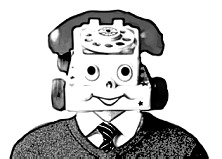
"I am so sick of the cults."
"Your not killing people in my name, your just a murderous asshole."

"You wanna make me happy? give me shoes and soap, come to my restaurant, buy food!"

"and by the way, I have no inspirations I inspire myself, I'm the way I am because no one else can be me, and that's the way it should be."
#Mod Monnie: My inspirations for charlie/the way I come up with answers are#honestly just alot of what comes to my mind instantly when I read a question#I don't really take time to think when I answer charlie asks#the only time I put acutal thought into this is when making thoes image edits#or thinking about who to send charlie asks to!#but regardless I think my humor and thoughts about charlie has been influenced by#DSAF. Brendaniel. HLVRAI. Goat Simulator. and many other pieces of chaotic media#but genuinely this is all improv#improv almost all the time made up on the spot#rest assured even if it's made up on the spot I do try and stay consistent and keep up to date making sure what has been made canon stays#thanks for asking!#charlie the phone guy#charlie the cursed phone guy#dsaf#dayshift at freddy's#classic verse
9 notes
·
View notes
Note
15, 16, and 42 for charlie! For 15 I'm curious what his voice sounds like too 👀
charlie my boy the love of my life!!! his doc is 67 pages please send help
15. How do they speak? Is what they say usually thought of on the spot, or do they rehearse it in their mind first?
I love this one. I think most of everything he does could be described as intentional, and that applies to what he says and how he says it as well. I don't think he necessarily plans everything out, but he's aware that there are always people paying attention — whether that's people who depend and look up to him, like his siblings or his team, or if it's things like the media — he knows that he's rarely representing only himself. that's not to say that he doesn't let loose or make jokes or swear etc but he's probably never going to say something disastrous in public.
he does have a pretty good sense of humor and is a witty chirper though! he's also unquestionably tired and spends a good amount of time lovingly chastising those around him for what should be common sense.
as for what his voice actually sounds like, i'd say he commands respect without his voice being particularly deep or loud. he also has a noticeable boston accent and is somewhat in denial about it. it's not the thickest accent you've ever heard but if you ask him his own name he'll say chahlie with his whole chest.
16. What makes their stomach turn?
without a doubt, it's the idea of disappointing/failing those he cares about or making a mistake that impacts others. it's not that he can't admit when he's wrong (though he hates it) but if he makes a mistake he would rather jump on that grenade without hesitation than allow even the chance that it could impact anyone else. he's also put so much responsibility on himself he can't imagine living without it - no matter if that means letting go of it, allowing someone else to handle it, or losing control of a situation by other means.
42. How badly do they want to reach their end goal?
He's only ever had one thing he's been working for his whole life, and that's to become a major league baseball player. if pressed, he could conceivably come up with other jobs he'd do if that didn't work (he'd say probably become a mechanic or a longshoreman like his dad, but he'd actually likely go into something more public service focused like firefighting or teaching) regardless, baseball is who he is and it's very singular, his whole life has led up to that. he does have other goals though — become one of the first people in his family to go to college, keep his full ride once he gets there, be a good influence on others, eventually marry his girlfriend — and he commits extremely hard to everything he puts his mind to. to him, everything requires the same level of intensity, he just doesn't know how to turn down the dial, no matter what his focus is
3 notes
·
View notes
Text
Can we talk about Bluey for a sec?
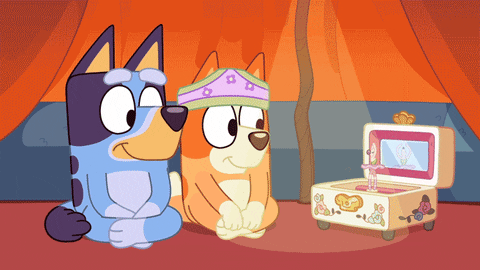
This is a long one, but something that's been on my mind for a while. I've mentioned I'm a fan of this show a few times on my blog now, but I think it's time I delve in and highlight what this show has accomplished, and why I think it deserves to be seen by others.
For those who may not have seen it yet, I'll give a little bit of background. Bluey is a Disney Jr. original made by longtime animator Joe Brumm (Who also worked on the equally awesome Charlie and Lola back when I was a kid!). The series takes place in the real life Australian location of Brisbane, but with actual dogs in the place of the humans. The main setup for this show is to highlight the day to day life of little 6 year old Bluey heeler, along with her sister Bingo, mother Chili, and dad Bandit.
Throughout the various episodes, we see how playtime and games of pretend affect each of the main cast, and the show stresses how important this time is to help not just the children, but the parents too to grow as people. We often see Chili and Bandit getting involved with their children's games or being a strong influence in their lives, and the show frequently highlights the mother and father's wonderfully realistic, but beautiful relationship. This is something I always felt was done especially well here, and is something that is a lot more rare in children's cartoons than one might expect.
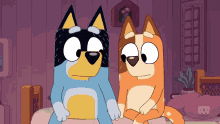
Joe Brumm's vision for this show was to not only give a closer look into the more suburban side of Australia, but to also highlight his own experiences as a parent and show how beautiful playtime can be. While the show may be a Disney Jr. original, it is most certainly intended for all ages to take something from it. Its humor is expertly written, enough to get groups of all ages laughing at the family's antics, but there is also a distinctly emotional side as well. In my time of watching this show I've seen it discuss serious topics such as:
Death, and how children can learn to cope:
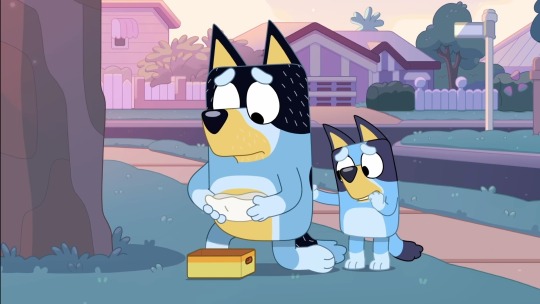
How quickly friends can sometimes come and go, but the memories will never leave you:
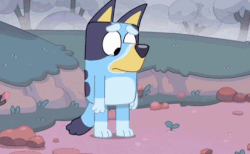
Regardless of whether you're a mother or father, parental stress is going to happen, and in Bandit's case, it's okay to need to take a step back and breathe. While on the flip side, Chili has to learn to enjoy the moment and realize that everything will work out in the end:
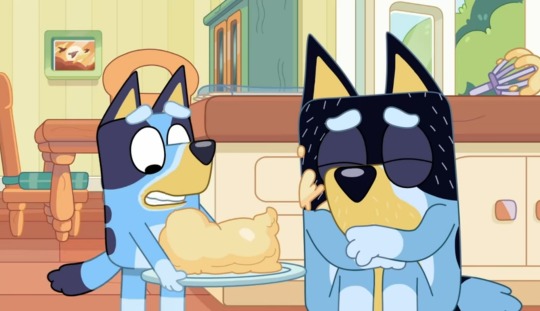
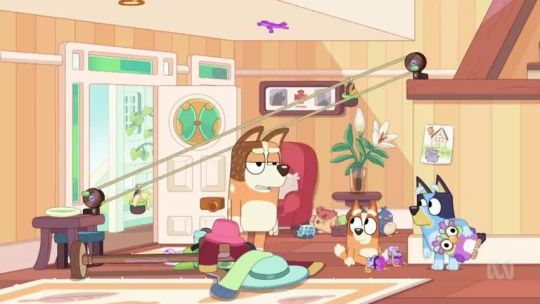
Your family will always be here for you, even when you can't see them:
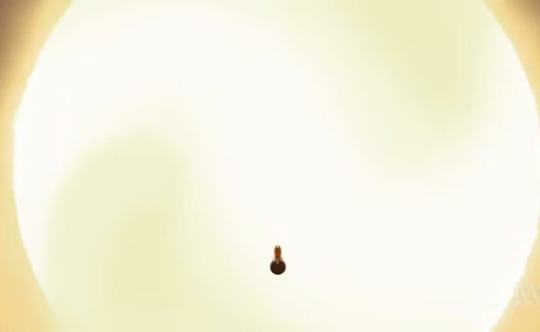
And finally, and my personal favorite lesson; the impact we can have on a child's life with even the smallest of gestures.
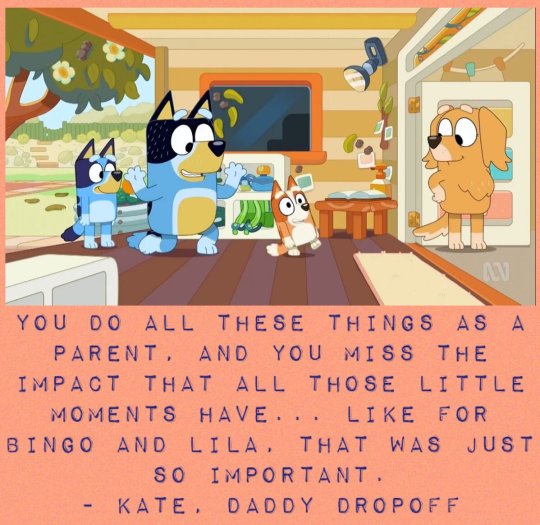
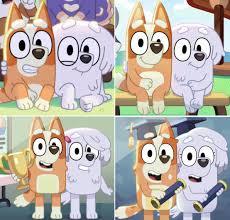
Each episode of this show I feel deserves their own posts, especially just how much depth and love goes into the making of each one, (which I'm considering doing a small series of if there's interest). After I was able to binge both season 1 and 2 for myself recently, I feel like I walked away a better person, even though I have yet to have any kids of my own yet. It's wide range is one of Bluey's best strengths. Regardless of whether you're a kid, teen, adult, or a new parent that happens to be watching it with your little one, there is something everyone can take away from this incredible little show. During a time where I had to leave behind my home and find my way in life, I couldn't have asked for better guidance in life than from Bluey.
I don't usually do longer pieces on my blog, but Bluey is something I feel genuinely changed me as a person, and it needs to be shared. I can only hope that my post here might convince any newcomers to give Bluey a chance, and that you too are able to find appreciation in what might be one of the best children's cartoons of all time.
(A quick side note: Since I can't go in depth here without making this post a couple years long, I thought of an alternative. If any of you are wanting to see me make a separate little episode-by-episode analysis series, I'm more than happy to give it a go if that means it'll help gauge more interest in Bluey! I hope to see you then!)
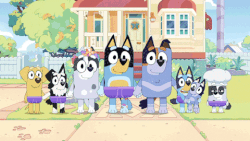
"Gotta be done!"
#lucky rambles#Disney#disney jr#Bluey#tw death mention#tw anxiety#This has been on my mind for a while#This show has been my comfort food since I moved out#I want to be able to share how special it is with people#cartoons#Bluey is for everyone!
1K notes
·
View notes
Note
Charlie Chan. Who is fascinating, because he was created explictly to be an anti-Yellow Peril character. Unlike most Chinese characters of the time, he's both intelligent, physically capable, and unambiguously heroic. In the novels, he's simultaneously proud of being Chinese AND proud of being an American citizen. He gives orders and instructions to white people, and the narrative treats this as perfectly normal and acceptable. There's a bit in the first book, when an attempt to trap the..(1/2)
(cont'd)There's a bit in the first book where an attempt to trap the protagonist fails, because a message supposedly from Charlie clearly isn't because Charlie's English isn't broken, it's like poetry. Etc. The movies made him more stereotypical, & played by white actors in yellowface, but still, he's a heroic Chinese man, who is as capable and patriotic as any white man. Nowadays, he's thought of as racist caricature. Which he is, but still, it makes one think.
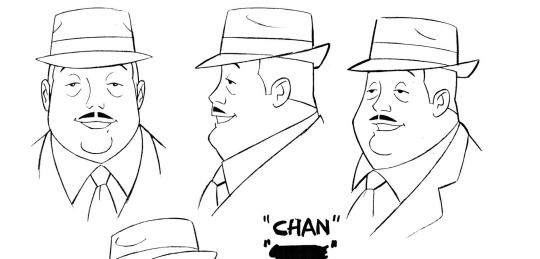
I'm not nearly as acquainted with Charlie Chan as you are (and I definitely suspected he was less racist in the original books because that's nearly always the norm when it comes to pulp characters) but yeah, that "Which he is" is forever going to be the most unfortunate and saddest part of it all when it comes to Charlie Chan. For all the virtues that can be bestowed on Charlie Chan, for everything great that the character had going for him and inspired, the fact that the least offensive image of the character I could find to put here for illustration's sake is from the Hanna-Barbera cartoon kinda exemplifies the big elephant in the room when it comes to Charlie.
Charlie Chan is a great example of two things: One is the way progress is never a fixed quantity and often what was progressive and forward-thinking in it's time can become something outdated and backwards and downright offensive given enough time, and the 2nd is my constant stressing that this is all the more incentive to reclaim the pulps and either highlight or fix aspects of them, instead of dismissing every aspect of them based on the preconception that everything about it's history is unforgivably bigoted and must be handled with the nuance of a sledgehammer.
I stress time and time again the need to highlight and understand the prejudices that went into pulps, because either ignoring them or wielding them as a weapon to attack them does no favors to anyone. The pulps weren't exceptionally bigoted - look at literally any medium in it's time period and you'll find bigotry and prejudice and hatred - and they were exceptional in the number of POC heroes and heroines. Pulps were a medium of experimentation and cheap entertainment that gave way to much, much more varied kinds of protagonists than were permitted in films, serials, novels, comics and radio serials of the day. Imagine if no one was allowed to bring up and discuss superheroes without mentioning the Superman Slap-a-Jap posters or the Captain Marvel story so horrifingly racist it was recounted by an American ambassador after it deeply offended a friend's son and a major influence on the 1950s anti-comic trials. "Pulp fiction had deeply, unforgivingly racist depictions that deserve intense scrutiny and cannot be ignored" and "Pulp fiction was significantly ahead of every other medium at the time in regards to authors and editors striving to publish stories about heroic POCs, this cannot be dismissed and is something that needs to be perpetuated" are not exclusive facts. "A product of it's time" is not an excuse and never was, but it's a fact nevertheless.
Every time someone speaks favorably of Charlie Chan in any capacity, they have to start with a long preface of everything positive that the character had going for him. Yes, he's a deliberate subversion of the Yellow Peril, he's a heroic protagonist, he's plump and good-natured and humorous but far from a joke, he's friendly and pleasant and well-educated and wise, he's a good dad and family man and a terrifically sharp detective who's so good at his job he gets called to solve crimes all over the world, and none of these traits are apparent to people who have to google the character and repeteadly see a white man in awful make-up into every single image of the character, who watch the movies and cringe at the broken English. It's hardly relevant in the face of all the Asian-American critics who acknowledge the character's virtues but rightfully point out that this fortune-cookie spouting caricature, acting subservient to whites and whose virtues are based around his proximity to a white American ideal, doesn't represent them and they shouldn't pretend it does.
Which isn't to say that to like Charlie Chan is "wrong", a lot of East Asians love Charlie and the character's obviously got fans in Asian Americans. It's a complicated subject and I obviously cannot begin to vouch in a subject so heavily based around perceptions I cannot experience. And I deeply detest the idea of speaking for others on their particular experiences on this kind of matter, which is something Americans do a lot everytime they talk about representation in media.
So instead, I'm going to tackle this on a roundabout manner by going on an unrelated tangent to bring up an example of representation that isn't quite representative of what it's supposed to be, has a lot of issues that have been dissected by critics among the people it was supposed to represent, and none of that stopped the character from being popular and beloved and from being claimed anyway. And it's a Brazilian fighting game character, which means it's completely within my ballpark.
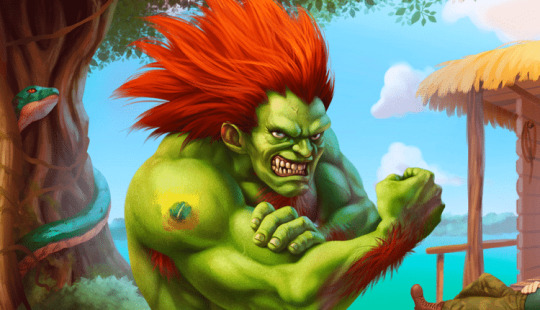
Yeah, obviously Blanka doesn't look like anyone who lives in Brazil (whatever resemblance he bears to redheaded jungle protectors of Brazilian folklore is purely accidental). Obviously neither Jimmy nor Blanka are Brazilian names or even exist in the Portuguese lexicon. Obviously there are issues in Street Fighter's approach to representation across the board, sure, and I'd actually say Laura is much worse than Blanka in that regard (again, my opinion, obviously not universal), but the fact remains that Blanka is and has always been pretty controversial. Obviously there's Brazilians who took offense to Blanka and they weren't wrong to do so, and I obviously do not speak for everyone here, that goes without saying.
Obviously the idea that Brazil's major representative in a global cast of characters, the first big name Brazilian character in videogames, is going to be a freakish jungle monster who roars and bites faces has problems, as is the fact that all the others get to be regular people representing fighting styles from their countries while Blanka doesn't. None of the Brazilian SF characters represent Capoeira, which is kinda shitty to be honest. And there's a whole stereotype of Brazil as a backwards land of beasts and savages that Blanka's creation played into. There's no shortage of ground to criticize Blanka's representation and Ono actually apologized in an interview once, but then he learned one teensy little thing:
Street Fighter is very popular on Brazil. Would you like to leave a message to the fans from there?
"Ono: Yes, I'm aware. At the time of Street Fighter II a lot of the arcade machines produced went there, so I knew we had lots of fans there. A message to Brazilians, well, I'd like to apologize. I know Blanka's a weird character and I don't want any Brazilian to feel uncomfortable with that.
When Blanka was conceived, we knew there were forests in Brazil, and so we thought he could look like that. I was actually kinda nervous knowing I'd meet Brazilian journalists. Still, this is the first Street Fighter in ten years, so we'd like all fans to play, including Brazilians, which are many.
Thanks. Well, but you should know that Brazilians love Blanka
"Ono: Ah, good! I was scared of getting beat up if I ever went to São Paulo! (laughs)"
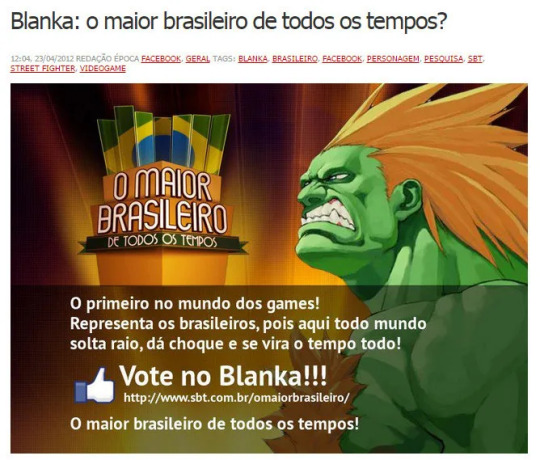
(That's from a 2012 tv special called The Greatest Brazilian of All Time where over a million viewers voted to elect whoever they wanted, and Blanka was going to win. He was polling ahead of Aryton Senna and PELÉ, fucking Pelé, yes this happened. He wasn't even disqualified for being a cartoon character, it was an open poll, he was disqualified due to canon stating he had been born in Thailand, which I think may have been retconned since then. Again, A MILLION BRAZILLIANS voted for this contest, and Blanka was going to win.)
Blanka is great and sweet and lovable, he made the best out of the incredible shitty hands fate dealt him and became a cool and strong green man who shoots lightning and flies, a self-taught warrior who rides whales and planes to fighting tournaments, and he loves his mom and friends and kicks ass and after he's done he dances in joy and gives the kids of his village piggyback rides, and Brazil loves him. He doesn't represent any existing person or fighting style, he's rooted in a negative stereotype and incorrect assumptions, he's not even really Brazilian, and he's our boy and nobody can take him away from us.
No criticism of Blanka, no matter how in-depth or even right it is, is ever going to affect that, because regardless of what was wrong or misguided and offensive about him, we claimed him and loved him so throughly that Capcom kept playing up Brazilian representation in every subsequent game post Alpha, and because of Blanka's impact and reception in such a big game, Brazilian characters have become a staple of fighting games, and that's how we got much more diverse representatives in those games. Fighting games have more Brazilian representation than LITERALLY ANYTHING ELSE on media not produced here. It started as BAD representation, with way less thought put into it than Charlie Chan, and it still mattered to a lot of Brazilians who reclaimed it and made it better than it was ever intended to be, and as a response to it, it gradually became better.
Progress is not a fixed quantity, it's an uphill battle, and it's not unwinnable. Everything's gotta start somewhere.
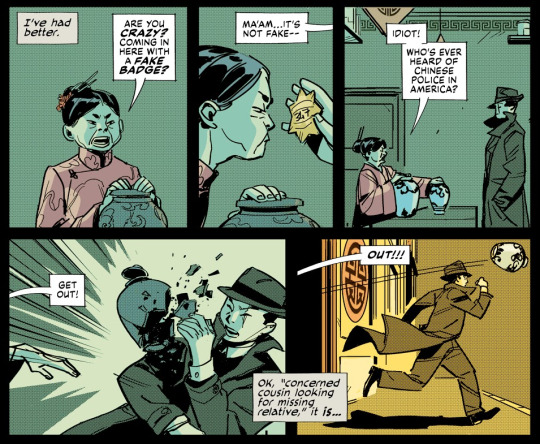

The Good Asian is a ongoing comic that I think does the best job I've seen yet of handling an Asian American detective protagonist, which is not really a high bar in the first place, and more to the point, The Good Asian illustrates the 2nd part: the reclaiming. The Good Asian deals a lot with the realities that a 1930s Asian-American detective would run into, the strained circumstances and relationships between said character and the world around him, because it's born from an author who took a look at Charlie Chan and Mr Moto and the like and recognized the potential in those stories that could not be fulfilled in it's time period by the people writing said stories.
The Good Asian pays little reverence to Charlie Chan, but it acknowledges that it cannot exist without Charlie Chan, and it reclaims the Charlie Chan premise at the hands of someone more adequately equipped to tell a gripping story that goes places none of Charlie's contemporaries would ever go. Regardless of how good or bad of representation Charlie Chan was, Charlie Chan mattered and was beloved and inspired a better example for others to improve on or rebel against.
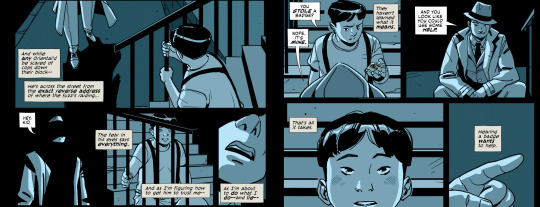
I desperately wish that I could google Charlie Chan without having to look at a guy in yellowface, and the ONLY way that's going to happen is if the character ever gets meaningfully brought back and reclaimed for good by people who can meaningfully tackle the character and present him as he should have always been presented.
And then, I imagine it would be a lot easier to show people on how swell Charlie really is. A true, positive role model and hero, who no longer has to look like a gross cartoon to be able to exist at all. Who can finally be what he was always meant to be, and always was deep down.
#replies tag#pulp heroes#pulp fiction#charlie chan#detective fiction#the good asian#street fighter#blanka
52 notes
·
View notes